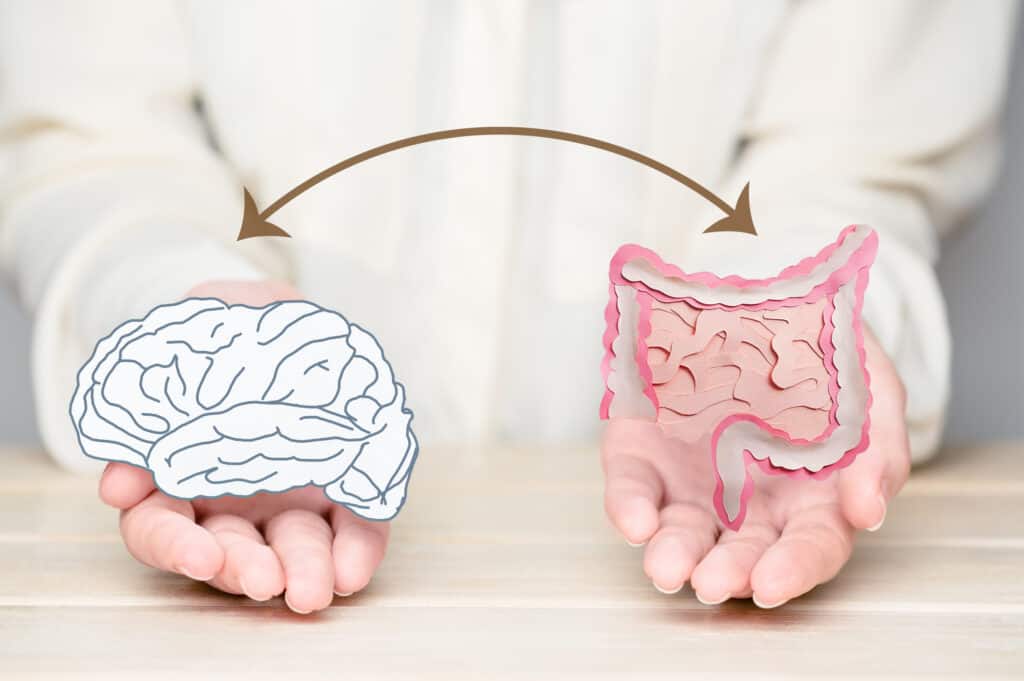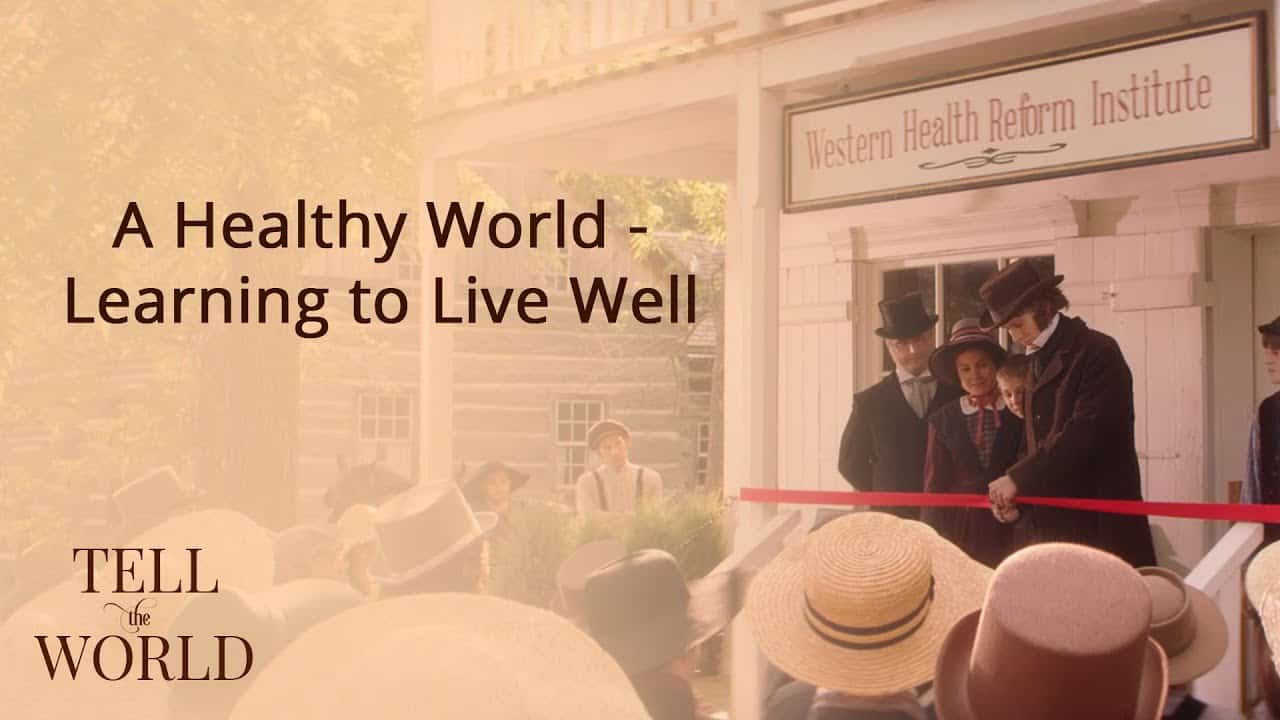Ellen G. White was a prominent figure in Seventh-day Adventist Church history. She was influential in forming and developing the church as well as a health reformer. Her work drove the development of several Adventist health institutions, then referred to as sanitariums. Her inspired counsel on health, based on biblical truths, is arguably the inspiration for one of the world’s “Blue Zones,” or healthy populations with a high number of centenarians.((https://www.bluezones.com/exploration/loma-linda-california/ ))

She understood that the health of our bodies can impact the health of our minds. It can also impact our spiritual health. Let’s take a look at what she had to say about health reform, and the connection between healthful living and a strong spiritual life.
We will cover:
- What health and wellness looked like in Ellen White’s time
- The relationship between physical health and spiritual health
- Counsel on physical health
- Counsel on temperance (moderation and smart choices)
- Counsel on diet and nutrition
- Counsel on mental health
- Counsel to individual situations we can also learn from
- All counsel must include God’s grace
- Ellen White’s health reform legacy
This is a very meaningful subject for many people, so let’s comb through her counsel on each different facet of health.
What health and wellness looked like in Ellen White’s time
Ellen White lived most of her life in the 19th century. She died in 1915 at the age of 87, when the average life expectancy around 1900 was 49!((https://www.nytimes.com/2006/09/27/business/27leonhardt_sidebar.html )) Most of her life was during the Second Industrial Revolution in the United States, which brought about major changes in American life.

She lived during a difficult and scary time in American history as the country shifted from primarily agricultural lifestyles to factory-driven schedules and poor working conditions. She saw how the negative effects of poor health would keep people from experiencing the abundant life God intended for us.
This gives us the appropriate framework when reading her counsel. Health reform was more than an interest for her. It was nearly a matter of life or death.
Many scientific advancements had been made during her lifetime, especially in the fields of biology and medicine. But poor relations between the US and other countries restricted US doctors from much of that information until years later. As a result, germ theory was not widely accepted in America. Hand-washing and other sanitizing methods were not regularly practiced.
American doctors continued using methods such as bloodletting and leeching. They also prescribed tobacco, opium, and other “medicines” to their patients. Many of these medicines contained heroin, cocaine, mercury, or arsenic.((https://www.history.com/news/7-of-the-most-outrageous-medical-treatments-in-history ))
What’s more, unmanaged diseases and contamination were responsible for many deaths during this time. For example:
- Contracting Tuberculosis (or TB, a lung disease) typically meant the patient would die from this as no cure or sufficient treatment had been developed. This was the 2nd leading cause of death in 1900 (killing nearly 200 in 100k).((https://www.cdc.gov/mmwr/preview/mmwrhtml/mm4829a1.htm ))
- Pneumonia and Influenza killed more than TB, even though contracting these did not indicate near-certain death in the same way.((https://www.ncdemography.org/2014/06/16/mortality-and-cause-of-death-1900-v-2010/#:~:text=In%201900%2C%20the%20top%203,th%20leading%20cause%20of%20death) ))
- Childbirth killed 800 in 100k due to unskilled doctors and little knowledge of germ theory.((https://www.slate.com/technology/2013/09/death-in-childbirth-doctors-increased-maternal-mortality-in-the-20th-century-are-midwives-better.html ))
- Infant mortality was 150 in 1,000, or as high as 30% in some cities, due largely to unsafe drinking water and contaminated food.((https://www.history.com/news/7-of-the-most-outrageous-medical-treatments-in-history ))
So when she wrote, “If any among us are sick, let us not dishonor God by applying to earthly physicians, but apply to the God of Israel. If we follow his directions (James 5:14-15) the sick will be healed,”((White, Ellen G., “To those who are receiving the seal of the living God,” Broadside 2, January 31 issue, 1849 )) her words make much more sense in the historical context. It was difficult to know if the doctors during that time could be trusted to have up-to-date knowledge. It doesn’t mean she was against seeking medical help when needed—especially in an emergency.
Industrialization was also driving more and more people to work in the cities. These people often worked low-paying jobs. Working and living conditions were often crowded, and filthy. Indoor plumbing got its start in the 1840s, but even by 1940, only half the homes in America had indoor toilets. And many homes still used coal for heating.((https://www.aceee.org/files/proceedings/2004/data/papers/SS04_Panel1_Paper17.pdf ))
Thomas Edison had parts of Manhattan lit up by 1882, though it wasn’t until 1925 that half of American homes had electric power.((https://www.nps.gov/edis/learn/kidsyouth/the-electric-light-system-phonograph-motion-pictures.htm )) And modern refrigeration was rare at a time when people needed to rely on city stores and vendors for food.
All this at a time before the FDA, housing protection, and worker protection laws existed, and the USDA still had a long way to go.
Without the appropriate amount of government oversight, the increased demand for packaged foods needed in city markets led to uncontrolled food adulteration practices and safety violations. This happened especially in the staples of the standard American diet: meat, dairy, coffee, and tea.
There were no inspectors in the meatpacking industry. The resulting poor conditions inspired Upton Sinclair’s The Jungle. Sinclair wrote that meat for canning and sausage was piled on the floor before workers carried it off in carts holding sawdust, human spit and urine, rat dung, rat poison, and even dead rats. His most famous description of a meat-packing horror concerned men who fell into “steaming lard vats!”((https://www.crf-usa.org/bill-of-rights-in-action/bria-24-1-b-upton-sinclairs-the-jungle-muckraking-the-meat-packing-industry.html ))
The booming demand also created poor conditions for the animals before slaughter. This resulted in farmers selling abused, sick, or dead animals to slaughterhouses.
Additionally, there were few practices in place to improve or preserve food quality in general:
- Milk was often watered down, and chalk or plaster was added for color.
- Butter contained an excess of salt to mask the poor water, potato flour, and curds composition
- Coffee, tea, beer and wine contained lead((https://www.history.com/news/food-fraud-a-brief-history-of-the-adulteration-of-food ))
- Spices contained dirt, sand, or leaves
- Vinegar contained sulfuric acid
- Common preservatives included borax, copper sulfate, sulfuric acid, and formaldehyde((https://www.culinarylore.com/food-science:food-adulteration-in-the-1800s/ ))
Given these facts, it’s not surprising that Ellen White wrote, “Let the diet reform be progressive. Let the people be taught how to prepare food without the use of milk or butter. Tell them that the time will soon come when there will be no safety in using eggs, milk, cream, or butter, because disease in animals is increasing in proportion to the increase of wickedness among men. … God will give His people ability and tact to prepare wholesome food without these things.”((White, Ellen G., Testimonies for the Church, vol. 7, p. 135 ))
The relationship between physical, mental, and spiritual health
Ellen White was a diligent student of the Bible, and she discovered how God’s word provides principles that not only guide our general life choices, but promote health and prevent disease. She also understood the relationship our physical bodies have to our mental and spiritual health.

She would not be the only health reformer to emerge from the madness of the Second Industrial Revolution. She knew that God desires for physical as well as spiritual healing and growth. God wants to ease the toll sin has taken upon our physical bodies as well as free us from its bondage for eternity.
True religion and the laws of health go hand in hand. It is impossible to work for the salvation of men and women without presenting to them the need of breaking away from sinful gratifications, which destroy the health, debase the soul, and prevent divine truth from impressing the mind… Many of these (men and women) are in great distress because they know not the truth in regard to these things. They are perishing for lack of knowledge.((White, Ellen G., The Review and Herald. November 12 issue, 1901 ))
Ellen White followed the example of Jesus, who spent more of His time healing than preaching. She endeavored to apply biblical health principles to her life and that of her family. She began to share these principles with others in meetings and booklets. She advocated for the creation of institutes and sanitariums to educate the people.
White understood that God’s people would be better equipped to spread the gospel if they were in good health. She also understood that the hearers of the gospel would more readily receive it if they experienced the healing power of the Creator’s health plan to ease their physical suffering.
Jesus set an example when He often healed the body before He would heal the soul (and sometimes they’d both be healed at once). And thanks to Maslow, modern science has recently caught up to the idea that basic physical needs have to be met before mental and spiritual growth can be expected.
“In teaching health principles, keep before the mind the great object of reform―that its purpose is to secure the highest development of body and mind and soul. Show that the laws of nature, being the laws of God, are designed for our good; that obedience to them promotes happiness in this life, and aids in the preparation for the life to come.”((White, Ellen G., The Ministry of Healing, p. 146. ))
When James White became sick after a stroke, Ellen applied the principles she’d been divinely given to nurse him back to health. Her success inspired the opening of the Western Health Reform Institute in 1866 (later renamed the Battle Creek Sanitarium).
Let’s look more closely at these health principles that contributed to such effective health reform.
Ellen White’s counsel on physical health
God had shown Ellen White the biblical and practical tenets of good physical health. These principles are largely accepted by many modern health and humanitarian programs today. However, we must recall the context of 19th-century America.

For example, no one by today’s standards would argue against the necessity for access to clean water and sanitary living conditions.
Thousands have died for want of pure water and pure air, who might have lived…. These blessings they need in order to become well. If they would become enlightened, and let medicine alone, and accustom themselves to outdoor exercise, and to air in their houses, summer and winter, and use soft water for drinking and bathing purposes, they would be comparatively well and happy instead of dragging out a miserable existence.((White, James S., How to Live: No. 4, p. 56 ))
But these necessary fundamentals needed to be fully understood, as they proved foundational to the further development of more advanced health practices.
A neglect of cleanliness will induce disease
This seems obvious today, but there were many basic hygiene practices that weren’t given much attention back then.

The children of Israel were in no case to allow any impurities to remain upon their clothing or upon themselves. Those who had any personal uncleanness were to be shut out of the camp until the evening, and then were required to cleanse themselves and their clothing before they could return. They were also commanded to carry all their refuse to a great distance from the camp. And this was a sanitary measure, as well as a religious regulation. The Lord requires no less of his people now than he did anciently.
Sickness does not come without a cause. Violent epidemics of fevers have occurred in villages and cities that were considered perfectly healthful, and these have resulted in death or broken constitutions.
In many instances the premises of the very ones who fell victims to these epidemics, contained the agents of destruction which sent forth deadly poison into the atmosphere, to be inhaled by the family and the neighborhood. It is astonishing to witness the prevailing ignorance relative to the effects which slackness and recklessness produce upon health.((White, Ellen G., Christian Temperance and Bible Hygiene, p. 105 ))
Addressing medical myths of her time
Common medical treatments for fever were all about getting the heat or toxins out. This often meant bloodletting, inducing vomiting or diarrhea, or even excessive drooling! All of these things cause dehydration, which makes things worse.((https://www.historicoregoncity.org/2019/04/02/doctors-and-diseases-on-the-oregon-trail/ ))
If, in their fevered state, water had been given them to drink freely, and applications had also been made externally, long days and nights of suffering would have been saved, and many precious lives spared. But thousands have died with raging fevers consuming them, until the fuel which fed the fever was burned up, the vitals consumed, and have died in the greatest agony, without being permitted to have water to allay their burning thirst. Water, which is allowed a senseless building to put out the raging elements, is not allowed human beings to put out the fire which is consuming the vitals.((White, James, How to Live: Number 3, p. 62-63 ))
Advocating for fresh air and exercise
Her words need no further explanation:
We are more dependent upon the air we breathe than upon the food we eat. Men and women, young and old, who desire health, and who would enjoy active life, should remember that they cannot have these without a good circulation. Whatever their business and inclinations, they should make up their minds to exercise in the open air as much as they can. They should feel it a religious duty to overcome the conditions of health which have kept them confined indoors, deprived of exercise in the open air.((White, Ellen G., Counsels on Health, p. 173 ))
In order for the brain to have clearness and strength of thought retentive memory, and mental power, the muscles of the body should have exercise a portion of each day in order to preserve and improve health.((White, Ellen G., The Health Reformer, March 1 issue, 1873 ))
Air, the precious boon of heaven, which all may have, will bless you with its invigorating influence if you will not refuse it entrance. Welcome it, cultivate a love for it, and it will prove a precious soother of the nerves…. The influence of pure, fresh air is to cause the blood to circulate healthfully through the system. It refreshes the body and tends to render it strong and healthy, while at the same time its influence is decidedly felt upon the mind, imparting a degree of composure and serenity. It excites the appetite and renders the digestion of food more perfect, and induces sound, sweet sleep.((White, Ellen G., Testimonies for the Church, Vol. 1, p. 702 )) (Modern corroboration)

The importance of the basics—getting proper rest and appropriate exposure to sunlight
This is one of nature’s most healing agents. It is a very simple, therefore not a fashionable remedy, to enjoy the rays of God’s sunlight and beautify our homes with its presence.((White, Ellen G., Testimonies for the Church, vol. 2, p. 527 ))
Go out into the light and warmth of the glorious sun, you pale and sickly ones, and share with vegetation its life-giving, health-dealing power.((White, Ellen G., The Health Reformer, May 1 issue, 1871 ))

Some of her advice sounds like it could have been written today:
Unreasonable hours are destructive to the physical, the mental, and the moral powers. If the brain were given proper periods of rest, the thoughts would be clear and sharp, and business would be expedited.((White, Ellen G., Testimonies for the Church, vol. 7, p. 256 ))
But many of her claims, when they were written, were well before their time. Some claims were more than 100 years before science had proven them true. For example, the body repairs itself during sleep:
You are God’s workmanship, and with the full sense of your accountability to God you are to treat yourselves aright. Give yourselves proper time to sleep. Those who sleep give nature time to build up and repair the waste of the organism.”((White, Ellen G., The Medical Missionary, May 1 issue, 1889 )) (Modern Corroboration)
Ellen White’s counsels on temperance (moderation and smart choices)
Again, no one privy to modern science would argue these points. White’s counsel on temperance would be considered good common sense by today’s standards as well.

In order to preserve health, temperance in all things is necessary – temperance in labor, temperance in eating and drinking.((White, James, How to Live, p. 57 ))
She also said we should live a balanced lifestyle, avoiding extremes.
Care needs to be exercised in regard to the regulation of hours for sleeping and laboring. We must take periods of rest, periods of recreation, periods for contemplation…. The principles of temperance have a wider range than many think.((White, Ellen G., The Adventist Home, p. 494 ))
True temperance teaches us to dispense entirely with everything hurtful, and to use judiciously that which is healthful.((White, Ellen G., Patriarchs and Prophets, p. 562 ))
Ellen White’s counsels on diet and nutrition
Ellen White advocated for a balanced lifestyle. She also addressed the dangers of overworking, of being sedentary, of getting enough sleep, and of proper hygiene and maintaining a clean home. But so much of our health depends on what we put into our bodies. So made sure to provide plenty of guidance in the area of nutrition—especially considering the times she lived in.

In order to maintain health, a sufficient supply of good, nourishing food is needed. If we plan wisely, that which is most conducive to health can be secured in almost every land. The various preparations of rice, wheat, corn, and oats are sent abroad everywhere, also beans, peas, and lentils. These, with native or imported fruits, and the variety of vegetables that grow in each locality, give an opportunity to select a diet that is complete without the use of flesh meats.((White, Ellen G., Ministry of Healing, p. 300 ))
Today, you’d be hard-pressed to find a person of science that advises against incorporating a wide variety of fruits, vegetables, grains, nuts, and legumes into your diet. This is also what God originally intended (Genesis 1:29).
But in addition to what we need to put into our bodies to stay healthy, she also identified what we should avoid. Her definition of temperance also includes abstinence—abstaining from anything “hurtful.”
We’ve seen her address the avoidance of certain “medicines” as well as certain foods, due to the presence of toxins and fillers. We’ve also looked at the poor sanitary practices of her day.
But is there more to it than that?
Let the diet reform be progressive. Let the people be taught how to prepare food without the use of milk or butter. Tell them that the time will soon come when there will be no safety in using eggs, milk, cream, or butter, because disease in animals is increasing in proportion to the increase of wickedness among men…God will give His people ability and tact to prepare wholesome food without these things.((White, Ellen G., Testimonies for the Church, vol. 7, p. 135 ))
The liability to take disease is increased tenfold by meat-eating. The intellectual, the moral, and the physical powers are depreciated by the habitual use of flesh meats. Meat-eating deranges the system beclouds the intellect, and blunts the moral sensibilities. We say to you, dear brother and sister, your safest course is to let meat alone.((White, Ellen, G., Testimonies for the Church, vol. 2, p. 63 ))
Many of these were written around 1902. It’s evident she’d been advocating for this reform for some time.
The bottom line is, there are always healthier options we can turn to, which she listed above. So we can avoid animal products and any potential risk factors related to them, and still get the nutrition we need.
Ellen White’s counsel on mental health
Gratitude, rejoicing, benevolence, trust in God ‘s love and care—these are health’s greatest safeguards.((White, Ellen G., My Life Today, p. 151 ))

Ellen White understood that the health of our bodies had an effect on the health of our minds. Healthy habits including a healthy environment, diet, and exercise would lead to healthier, clearer thinking. She believed that when our minds are clear we can be more in tune with the message of the gospel and more responsive to our callings.
Some foods and drinks overstimulate the mind, causing anxiety to increase. Others, like alcohol, are depressants.((https://health.usnews.com/conditions/mental-health/depression/articles/is-alcohol-a-depressant )) Understanding the need for a clear mind, she even warned against the frequent consumption of coffee and tea. These contain caffeine, which can easily be overused.((https://www.healthline.com/nutrition/caffeine-side-effects#section1 ))
She also cautioned against the overuse of sugar for its stimulating effects.((https://www.wellandgood.com/how-does-sugar-affect-your-body/ ))
Between the mind and the body there is a mysterious and wonderful relation. They react upon each other. To keep the body in a healthy condition to develop its strength, that every part of the living machinery may act harmoniously, should be the first study of our life. To neglect the body is to neglect the mind. It cannot be to the glory of God for His children to have sickly bodies or dwarfed minds.((White, Ellen G., Mind Character and Personality, vol. 2, p. 373 ))
A continual transgression of nature’s laws is a continual transgression of the law of God. The present weight of suffering and anguish which we see everywhere, the present deformity, decrepitude, disease, and imbecility now flooding the world, make it, in comparison to what it might be and what God designed it should be, a lazar house; and the present generation are feeble in mental, moral, and physical power. All this misery has accumulated from generation to generation because fallen man will break the law of God. Sins of the greatest magnitude are committed through the indulgence of perverted appetite.((White, Ellen G., Testimonies for the Church, vol. 4, p. 30 ))
The Brain-Gut Connection
Modern science has just recently been uncovering how much your brain and gut are interconnected.

You have more than 100 million nerve cells lining your gastrointestinal tract. So, if you have ever “gone with your gut” or had a “gut-wrenching” experience, that is the work of your “second brain.” Scientists call this second brain the enteric nervous system (ENS). They are finding that your gastrointestinal (GI) health can have a huge impact on how you think.((https://www.hopkinsmedicine.org/health/wellness-and-prevention/the-brain-gut-connection ))
Just as the care of the body has influence over the well-being of the mind, the opposite is also true. The mind can have a dramatic effect on the health of the body. GI upset can be the cause or the product of anxiety, stress, or depression. Because of this, doctors are now considering the role of stress and emotion in healing gut issues. Some doctors are even prescribing antianxiety or depression medications for people with gut issues.((https://health.harvard.edu/diseases-and-conditions/the-gut-brain-connection ))
Ellen White was divinely inspired to write about this intimate connection over 100 years ago.
The influence of the mind on the body, as well as of the body on the mind, should be emphasized. The electric power of the brain, promoted by mental activity, vitalizes the whole system, and is thus an invaluable aid in resisting disease. This should be made plain. The power of the will and the importance of self-control, both in the preservation and in the recovery of health, the depressing and even ruinous effect of anger, discontent, selfishness, or impurity, and on the other hand the marvelous life-giving power to be found in cheerfulness, unselfishness, gratitude, should be shown.((White, Ellen G., Mind, Character, and Personality, vol. 1, p. 60 ))
Benefits of positive thinking and positive relationships
Ellen White also understood the health of the mind was dependent upon a positive relationship with God who created our minds and bodies.

The harmonious healthy action of all the powers of body and mind results in happiness; and the more elevated and refined the powers, the more pure and unalloyed the happiness. An aimless life is a living death. The powers of the mind should be exercised upon themes relating to our eternal interests. This will be conducive to health of body and mind.((White, Ellen G., Counsels on Health, p. 60 ))
Today, doctors and scientists are now discovering the specifics behind the health boosts that come from positive relationships. Dr. Dean Ornish outlined the findings of his clinical study of the effects of relationships on our health in his book, Love And Survival. His conclusion:
Our survival depends on the healing power of love, intimacy, and relationships. Physically. Emotionally. Spiritually.
How love plays into biological survival is still a mystery to many scientists. But Ellen White reinforced that we were made by our Creator as a result of His love, and redeemed through our Savior for a relationship with Him, which is the ultimate demonstration of love and sacrifice (1 John 4:7-9). Love is part of how we came into being. So no wonder it has such a profound effect on us.
Our Savior’s words, “Come unto Me, … and I will give you rest,” are a prescription for the healing of physical, mental, and spiritual ailments (Matthew 11:28).
Although humans have historically brought suffering upon themselves by their own misdeeds, He considers them with pity. In Him they may find help. He will do great things for those who trust in Him.
The spiritual life is built up from the food given to the mind; and if we eat the food provided in the Word of God, spiritual and mental health will be the result.((White, Ellen G., The Review and Herald, March 22 issue, 1906 ))
For her, there was no doubt—the true source of mental and emotional health was God, our loving Father, Jesus, our “Great Physician,” and the Holy Spirit, our “Counselor.”((https://www.dammang.com/ellen-g-white-and-mental-health/ ))
Counsel to individual situations we can learn from
Among Ellen White’s countless pages of writing, some were in the form of letters written to individuals with specific circumstances. They were seeking her counsel, so she prayed and studied about them and wrote letters in response.

Her reputation for having God-inspired wisdom had made her into an advice columnist of sorts. These letters were later compiled, made anonymous, and shared with the idea that others in similar situations could benefit from them.
There’s one thing to remember, however, when reading these pieces of counsel. In present-day attempts to understand history, frequently the past is judged by the present. But that would not be a fair judgment. The people of the past must be judged in the context of their circumstances, not ours.
For example, in the late 1800s and early 1900s, refrigeration was rare. Access to fresh fruit and vegetables depended on where one lived and the season. Meat substitutes were rarely obtainable before the introduction of peanut butter and dry cereals (mid-1890s). On some occasions, one either ate meat or nothing at all. Ellen White experienced this occasion herself. However, in most modern circumstances, eating meat is rarely a necessity in terms of the many alternatives that are now available.
In 1863, White was convinced that God’s people would do well to avoid eating “flesh food.”
She and her family made every effort to cut animal products from their diet. But there were times when meat-eating was unavoidable under the circumstances. For example, in 1873 she and her husband, James, were stranded in the wilderness of Colorado while traveling. They had been camping for three days waiting for a companion to return with supplies to repair the wagon. Their provisions for the trip were dwindling. So, out of necessity, they ate wild-caught game until better food could be found.((https://www.whiteestate.org/legacy/issues-vegetarian-html/ ))
She also wrote to individuals with recommendations to add eggs and dairy products back into their diet, even though these were normally things she would recommend people to steer clear of. In these situations the people involved could not afford, or did not have access to, the plant-based foods that would supply the equivalent nutrition. While she had eliminated animal products from her “bill of fare,” she was a gracious guest when ministering in poor communities.
In a letter to “Brother and Sister K,” White explains how eliminating items from one’s diet when you are unable to replace them with a plant-based equivalent is too extreme. This type of overly-strict diet had led to an illness for Brother K.
We are to be brought into connection with the masses. Should health reform be taught them in its most extreme form, harm would be done. We ask them to leave off eating meat and drinking tea and coffee. That is well. But some say that milk also should be given up. This is a subject that needs to be carefully handled.
There are poor families whose diet consists of bread and milk, and, if they can get it, a little fruit. All flesh food should be discarded, but vegetables should be made palatable with a little milk or cream or something equivalent. The poor say, when health reform is presented to them, “What shall we eat? We cannot afford to buy the nut foods.”
As I preach the gospel to the poor, I am instructed to tell them to eat that food which is most nourishing. I cannot say to them, “You must not eat eggs or milk or cream. You must use no butter in the preparation of food.”
The gospel must be preached to the poor, and the time has not yet come to prescribe the strictest diet.((White, Ellen G., “Letter 37,” Letters and Manuscripts, vol. 16 ))
Her advice comes with God’s Grace
Ellen White’s inspired writings touched on every aspect of health and health reform. As dramatic as some of her Godly advice sounds she advocated for a “progressive” reform. This allowed people the grace and understanding that they needed in certain circumstances. This was the same grace and understanding she needed as she made changes to her lifestyle as well.

Changes in certain emphases through the years only refined those principles, they did not add or subtract from them. As time passes, even prophets must take time to assimilate revealed principles—time for theory to become practice in their own lives. She constantly advocated the principle, in practice as well as in teaching, that everyone who is committed to truth will move from the bad to the good, from the good to the better, from the better to the best. Such was her experience.((Douglas, Herbert E., Messenger of the Lord: the Prophetic Ministry of Ellen G. White, p. 313 ))
When choosing to read her letters to individuals, we must be careful to avoid a narrow view of recommended health reform. These letters were for specific people, in specific situations. They do not apply to everyone. It is worth it, as a reader, to consider context with each page of counsel.
For example, she recommended a raw egg in grape juice be taken daily for Brother K, who was battling various things that caused weakness. These items were readily available to him and within his means. Should we all drink an egg in grape juice daily? No! The principle here is to ensure proper nourishment while avoiding as far as possible the potential for sickness and disease.
But she realized the potential for taking her advice to extremes. She wrote in response:
You need not go into the water, or into the fire, but take the middle path, avoiding all extremes.((White, Ellen, Counsels on Diet and Foods, p. 211 ))
She also provides some tips for how and when to avoid these extremes:
Some, in abstaining from milk, eggs, and butter, have failed to supply the system with proper nourishment, and as a consequence, have become weak and unable to work. Thus health reform is brought into disrepute. The work that we have tried to build up solidly is confused with strange things that God has not required, and the energies of the church are crippled. But God will interfere to prevent the results of these too strenuous ideas. The gospel is to harmonize the sinful race. It is to bring rich and poor together at the feet of Jesus.((White, Ellen G., Counsels on Diet and Foods, p. 207 ))
The White Estate has recommended some guidelines for reading Ellen White’s counsel.
Ellen White’s health reform legacy
Besides thousands of pages of inspired writings in books, letters, and manuscripts Ellen White was very instrumental in establishing faith-based sanitariums and education centers. These institutions were to apply the knowledge gained from the Holy Spirit, Scripture, and the best practices of the day. They link the health of the body to the health of the soul.
Do not be wise in your own eyes; fear the Lord and depart from evil. It will be health to your flesh, and strength to your bones
Proverbs 3:7-8 (NKJV)

Ellen White had her first major health reform vision from God on June 6, 1863. This was within days of the official organization of the General Conference of Seventh-day Adventists. Then her vision on Christmas day of 1865 led the church into institutional medical work.((White, Arthur L., The Progressive Years: 1862-1876, vol. 2, p. 9 ))
This direction from the Holy Spirit led her to the strong belief that if God’s people were in the best of health, they would be better equipped to share the gospel in varying circumstances and situations.
I saw that we should encourage a cheerful, hopeful, peaceful frame of mind, for our health depends upon our doing this. I saw that it was duty for everyone to have a care for his health, but especially should we turn our attention to our health, and take time to devote to our health, that we may in a degree recover from the effects of overdoing and overtaxing the mind. The work God requires of us will not shut us away from caring for our health. The more perfect our health, the more perfect will be our labor.((Ibid., p. 19 ))
The White family understood the weight of the message that was given to them to share. But they also felt the weight of their lack of practical knowledge. They knew little more than the average American of the time. So they sought the expertise of those who were already applying some of the principles they learned from her vision.
James White wrote about their first experience:
In the month of September, 1864, Mrs. White and self spent three weeks at the health institution at Dansville, Livingston County, New York, called “Our Home.” Our object in this visit was not to take treatment, as we were enjoying better health than usual, but to see what we could see and hear what we could hear, so as to be able to give to many inquiring friends a somewhat definite report.((White, James, How to Live: Number 1, p. 12 ))
Once they learned some practical applications, the Whites began a tour of New England. As they attended several meetings, they shared their knowledge of disease and its causes. It soon became clear that a more efficient way to communicate the message was needed.
They became inspired to publish pamphlets on the subject of health. James and Ellen, as well as other Adventists and selected writings from doctors, would fill the 64 pages of each booklet. Ellen White’s comprehensive 32-page chapter, titled “Health,” in Spiritual Gifts, vol. 4, was her first published material in the wide range of fundamental health matters.((White, Arthur L., The Progressive Years: 1862-1876, vol. 2, p. 89-90 ))
So how did a woman with a third-grade education and no medical training, living in the middle of a civil war (1861-1865), have such an impact on health reform? She received the basic principles via inspiration from the Holy Spirit. Then she sought the experience and counsel of physicians in order to teach others how to apply them.
After I had written my six articles for How to Live, I then searched the various works on hygiene and was surprised to find them so nearly in harmony with what the Lord had revealed to me. And to show this harmony, and to set before my brethren and sisters the subject as brought out by able writers, I determined to publish How to Live, in which I largely extracted from the works referred to.((White, Ellen G., The Review and Herald, October 8 issue, 1867 ))
The journey of many miles begins with a single step! God used a faithful and determined woman to guide a new Christian denomination to be His messengers of health and happiness to the world.
“By the turn of the century, the church had established 27 sanitariums and treatment rooms in the United States and abroad. At one time the Battle Creek Sanitarium was the largest institution of its kind in the world. In 1927 it had more than 1,500 beds.”((https://www.llu.edu/info/legacy/appendixe/ ))
During her lifetime, Ellen White advocated for people of the church to be leaders in health and wellness. She also supported many efforts financially. She could have had a much higher standard of living had she kept her book royalties for herself. But her God-inspired wisdom and generosity supported ministers, supported orphans, and helped to establish education and health institutions.
Today, more than 600 Adventist health institutions exist around the world, serving tens of millions of patients. Loma Linda, California, is home to the Loma Linda Children’s Hospital, Loma Linda University Medical Center, and Adventist Health Sciences Center.
And Loma Linda is known as one of the healthiest populations in the world.((https://www.bluezones.com/exploration/loma-linda-california/ ))
Other hospital networks, such as AdventHealth, are also on the cutting edge of medical advancements. AdventHealth launched a first-of-its-kind immunotherapy treatment.
It is easy to see why Ellen White is a well-respected figure in Seventh-day Adventist Church history. Her contributions through her inspired writings and even financial support cannot be measured. She is remembered as a health reformer that tied important Biblical principles to practical application.
Her belief that God’s people do their best work in spreading the gospel when they are in the best of health gave her the drive to spread the good news. Her message was that God’s health laws, when kept, are designed to ensure our health and happiness.
Want to learn more about God’s advice for a better life? Check out our online Bible studies.
